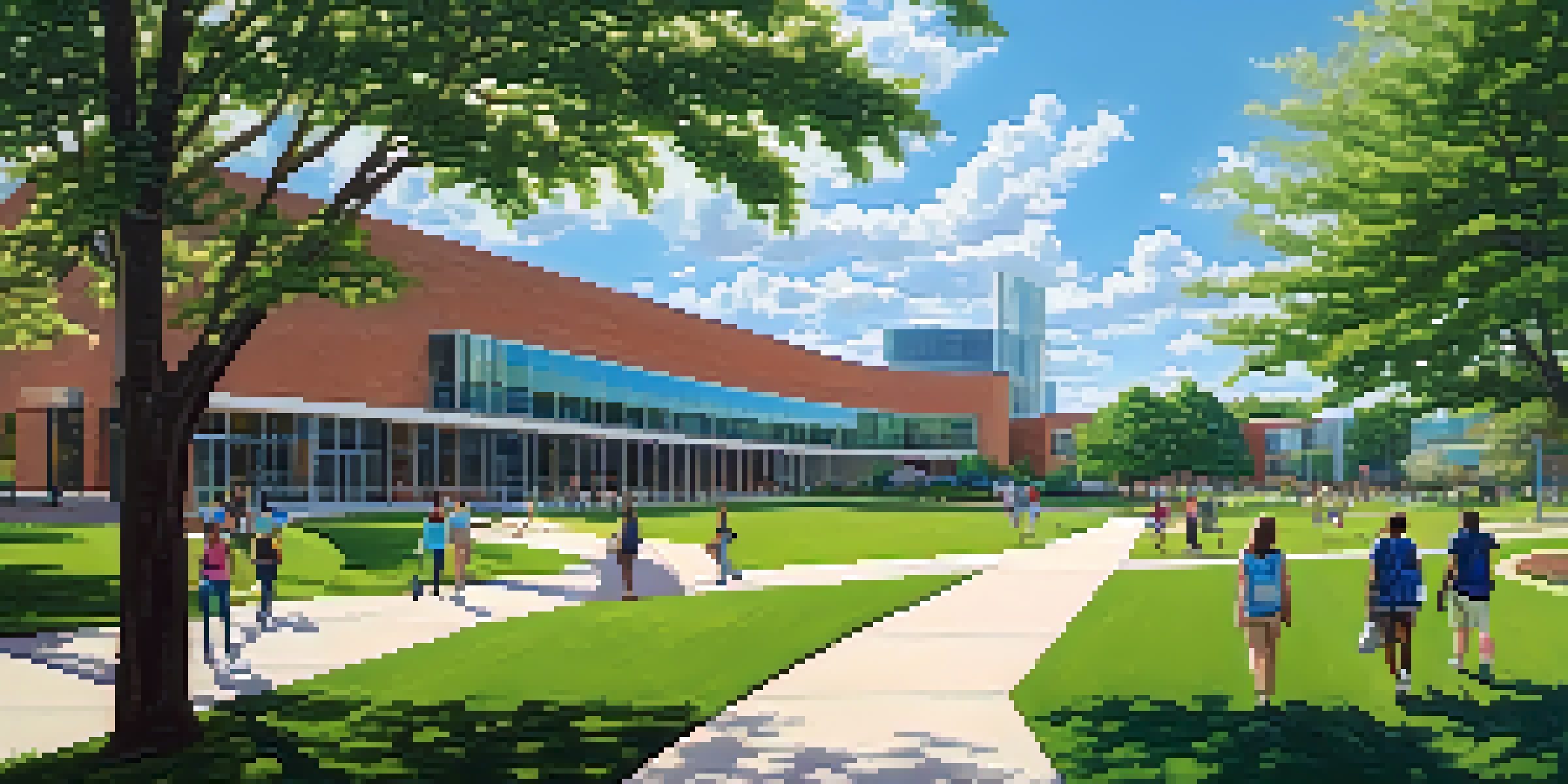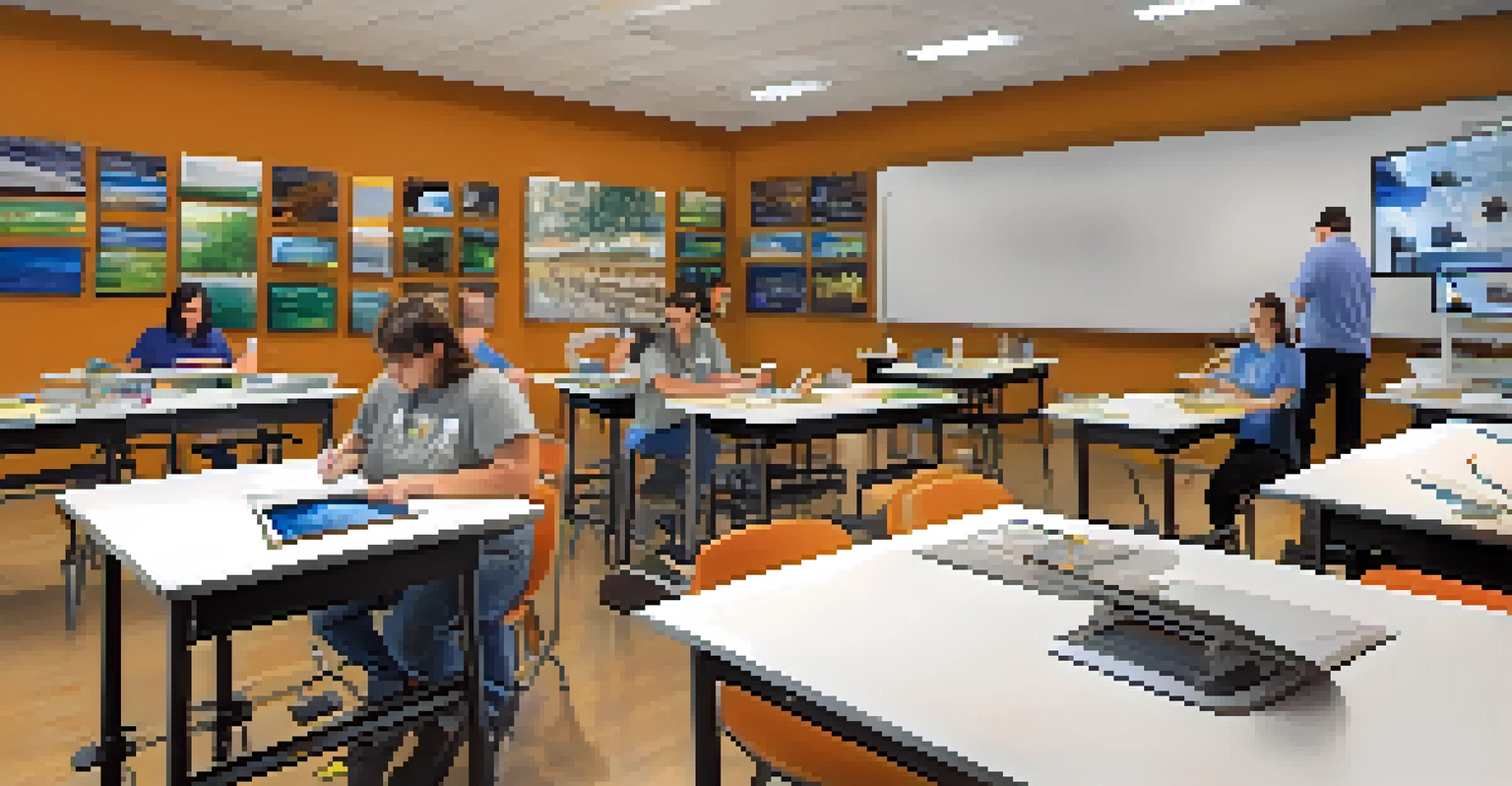Higher Education in Charlotte: Key Institutions and Programs

Overview of Higher Education Landscape in Charlotte
Charlotte, North Carolina, is home to a vibrant higher education scene that caters to a diverse student population. With a mix of public and private institutions, students have various options to pursue degrees across multiple disciplines. The city's commitment to education is evident in its investment in facilities and resources that support student success.
Education is the most powerful weapon which you can use to change the world.
In recent years, Charlotte has also seen an increase in enrollment numbers, reflecting the growing interest in higher education. This surge can be attributed to the region's economic growth and the demand for a skilled workforce. As businesses continue to flourish, educational institutions are stepping up to meet the needs of both students and employers.
Additionally, Charlotte's institutions often collaborate with local industries, providing students with hands-on experience and networking opportunities. This connection not only enhances the educational experience but also fosters a thriving community where students can thrive both academically and professionally.
University of North Carolina at Charlotte: A Leading Institution
The University of North Carolina at Charlotte (UNC Charlotte) is one of the largest and most prominent institutions in the region. With a comprehensive array of undergraduate and graduate programs, it serves over 30,000 students annually. The university is particularly well-known for its strong programs in engineering, business, and health sciences.

In addition to its academic offerings, UNC Charlotte is dedicated to research and innovation. It has established numerous research centers that focus on areas such as urban sustainability and energy. This emphasis on research not only enhances the academic environment but also contributes significantly to local and national industries.
Diverse Higher Education Options
Charlotte offers a variety of public and private institutions catering to a diverse student population across multiple disciplines.
Moreover, UNC Charlotte is committed to community engagement, encouraging students to participate in service-learning opportunities. This hands-on approach helps students develop valuable skills while making a positive impact in the Charlotte community, further enriching their college experience.
Queens University of Charlotte: A Private Gem
Queens University of Charlotte offers a unique educational experience with its small class sizes and personalized attention. This private institution emphasizes a liberal arts education, providing students with a well-rounded foundation in critical thinking and creativity. With a strong commitment to experiential learning, students are encouraged to apply their knowledge in real-world settings.
The beautiful thing about learning is that no one can take it away from you.
Queens is also known for its vibrant campus life, with a range of extracurricular activities, clubs, and organizations. This aspect of student life is vital for personal growth and helps foster lifelong friendships. The university's focus on holistic education ensures that students not only excel academically but also develop as individuals.
In addition, Queens University offers a variety of graduate programs, including those in business and education. These programs are designed to equip professionals with the skills needed to advance in their careers while contributing positively to the community.
Central Piedmont Community College: Gateway to Education
Central Piedmont Community College (CPCC) plays a crucial role in Charlotte's higher education landscape by providing accessible education to a diverse population. With multiple campuses across the region, CPCC offers a range of associate degrees, certificates, and workforce development programs. This makes it an excellent choice for students looking to enter the workforce quickly or transfer to a four-year institution.
The college is particularly known for its strong emphasis on technical and vocational training. Programs in fields like nursing, information technology, and culinary arts prepare students for in-demand careers. By aligning its curriculum with industry needs, CPCC ensures that graduates are well-equipped to succeed in their chosen professions.
Focus on Community Engagement
Institutions like UNC Charlotte and Johnson C. Smith University emphasize community service and hands-on learning to enrich students' educational experiences.
Additionally, CPCC offers flexible learning options, including evening and online courses, making education accessible to non-traditional students. This flexibility is essential for those balancing work and family commitments, demonstrating the college's commitment to serving the community.
Johnson C. Smith University: A Historic Institution
Johnson C. Smith University (JCSU) is a historically black university that has been an integral part of Charlotte's educational landscape since 1867. Focused on providing a rigorous liberal arts education, JCSU emphasizes leadership, community service, and social justice. The university's mission is to empower students to become engaged citizens and leaders in their communities.
With a range of undergraduate and graduate programs, JCSU attracts students from diverse backgrounds who are eager to make a difference. The university also fosters a strong sense of community, with numerous student organizations and activities that encourage involvement and personal growth. This nurturing environment helps students build meaningful connections while pursuing their academic goals.
Moreover, JCSU's commitment to social justice and equity is reflected in its community outreach initiatives. Through partnerships with local organizations, students gain valuable experience while contributing to the betterment of the Charlotte community, reinforcing the university's core values.
The Role of Online Education in Charlotte’s Institutions
As technology continues to evolve, many higher education institutions in Charlotte are embracing online education. This shift allows for greater flexibility and accessibility, catering to the needs of busy students and working professionals. Online programs have become increasingly popular, offering a range of degrees and certifications that can be pursued from anywhere.
Institutions like UNC Charlotte and Queens University have developed robust online offerings, ensuring that students receive the same quality of education as their on-campus counterparts. These programs often include interactive elements, such as live lectures and discussion forums, fostering a sense of community among online learners.
Embrace of Online Education
Higher education institutions in Charlotte are increasingly adopting online programs, providing flexibility and accessibility for busy students and working professionals.
Furthermore, online education opens doors for students who may not have been able to attend traditional classes due to geographical or personal constraints. This inclusivity is a significant advantage, as it allows a broader audience to benefit from the educational opportunities available in Charlotte.
Future Trends in Higher Education in Charlotte
The future of higher education in Charlotte is poised for growth and innovation. As the city continues to attract new businesses and industries, educational institutions are adapting their programs to meet the evolving demands of the job market. This trend ensures that students are equipped with the skills needed to succeed in a dynamic economy.
Additionally, there is a growing emphasis on interdisciplinary programs, combining various fields of study to provide a more holistic education. For example, programs that integrate technology with health sciences are becoming increasingly popular, preparing students for careers in emerging fields like telemedicine and health informatics.

Moreover, as collaboration between institutions and local businesses increases, students will benefit from more internship and job placement opportunities. This hands-on experience will not only enhance their education but also strengthen the connection between academia and industry, paving the way for a prosperous future in Charlotte.